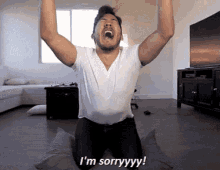-
News Feed
- EXPLORE
-
Pages
-
Groups
-
Events
-
Blogs
-
Marketplace
-
Funding
-
Developers
Apologies.... what I learned from the next POTUS

Apologies. What a farce. A social construct designed to appease the offended, to smooth over the sharp edges of wrongdoing with nothing more than empty words. “I’m sorry” is a tool of manipulation, a currency of weakness traded by those too fragile to confront the consequences of their actions. It’s theater—an act performed to restore balance, not because it’s deserved, but because it’s demanded. And people eat it up. They lap it up like starving dogs, desperate for the illusion of contrition, blind to how hollow it really is.
Apologies are not about accountability; they’re about control. Think about it. A well-timed “I’m sorry” can stop anger in its tracks, diffuse confrontation, and reset the board in your favor. It’s a weapon disguised as a concession. A well-placed apology doesn’t require sincerity—it requires strategy. If you can wield it correctly, it’s not a sign of weakness but of dominance. You dictate the terms. You decide when and how the wrong is acknowledged, and in doing so, you control the narrative.
But here’s the truth no one wants to admit: apologies mean nothing. They’re noise. Static. Words are wind, weightless and fleeting. Real power lies not in what you say but in what you do. Corrective behavior—that’s the currency that truly matters. It’s not the apology itself but the pattern of actions that follow it. And yet, how many people actually deliver on that promise? How many follow “I’m sorry” with genuine, meaningful change? Few. Very few. Because change is hard. It’s ugly, uncomfortable, and slow. Words, on the other hand, are easy. They’re quick. And they cost nothing.
When someone says, “I’m sorry,” what they’re really saying is, “I want this to go away.” It’s a plea for absolution, not a commitment to improvement. It’s a way to shift the focus away from their failure and onto your magnanimity. “Will you forgive me?” they ask, as if the real burden lies not with their actions but with your ability to let them go. It’s clever, really—a sleight of hand that makes their weakness your responsibility.
And people fall for it. They forgive. They move on. Because that’s what society has trained them to do. But not me. I don’t fall for words. I don’t need apologies. I don’t want them. What I want is something much more valuable—correction. Show me you’ve learned. Show me you’ve grown. Show me, through actions, that you understand the weight of what you’ve done and that you’ve taken steps to ensure it doesn’t happen again.
Actions. They’re the only thing that truly counts. Not the grand gestures of repentance, but the quiet, consistent decisions that prove someone is willing to change. That’s where the real power lies. Because actions are undeniable. They carry weight. They leave evidence. Words can lie, but actions—true, corrective actions—rarely do. They don’t need applause or acknowledgment. They simply are.
Here’s the sinister beauty of it all: society clings to apologies because they’re easy to give and easy to accept. They provide a tidy resolution, a clean break. But I don’t believe in clean breaks. I believe in consequences. I believe in watching someone struggle with the weight of their mistakes until they either rise stronger or crumble entirely. That’s the test. That’s where truth resides—not in the apology, but in the aftermath.
And let’s not forget the darker utility of an apology. A well-placed apology can be a weapon, a calculated move to regain control. It can disarm your opponent, reset the board, and put you back in the driver’s seat. When wielded with precision, an apology isn’t about contrition—it’s about leverage. The words themselves are meaningless, but the doors they open? Those are invaluable.
So let the world keep chasing its empty apologies. Let them cling to the illusion of closure, the comforting lie that “I’m sorry” is enough. I know better. I know that power isn’t found in words, but in actions. In the choices made after the apology, in the corrections that follow. And if those corrections don’t come, well, that’s just another kind of truth, isn’t it? A truth I can use.
Apologies are for the weak. Correction is for the strong. And me? I’ll take correction every time. Because in the end, actions don’t just speak louder than words—they speak the only language that matters.
- Audio & Video
- Art & Crafts
- Causes
- Dance
- Drinks
- Fitness
- Food & Drink
- Games & Gaming
- Gardening
- Health
- Home Improvement
- LGBTQ
- Literature
- Music
- Networking
- News
- Partisan Politics
- Religion & Spiritual
- Shopping
- Sports & Recreation
- Reviews
- Theater
- Wellness


